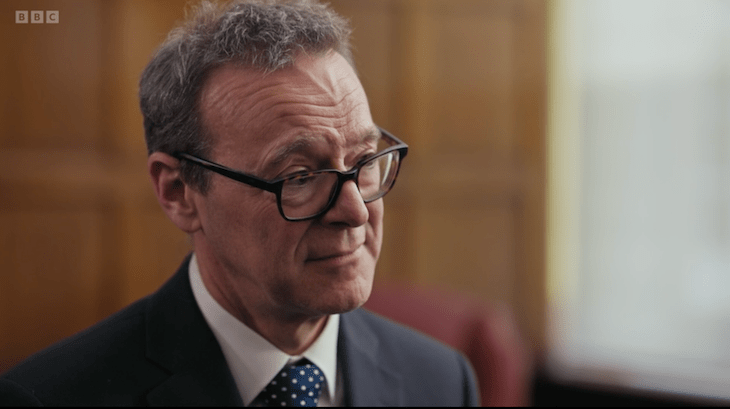Simon McDonald, the former Permanent Secretary of the Foreign Office, really needs to engage his brain before opening his mouth — especially when the television cameras are rolling. Lord McDonald of Salford has admitted revealing to his staff as well as ministers that he voted Remain in the 2016 EU referendum. His jaw-dropping confession — effectively a public admission from a former senior mandarin that he breached sacrosanct civil service impartiality rules — comes in a BBC documentary series on Brexit, Laura Kuenssberg: State of Chaos. Why on earth did he do it? His attempts at an explanation justifying this dereliction of duty reveal much about the sorry state of the civil service.
This is McDonald’s take on the atmosphere in his department after the country voted to leave the EU: ‘The main feeling in the Foreign Office building was of mourning,’ he said. ‘People were in tears. People were in shock.’
Tears? Is the Foreign Office filled with toddlers of nursery age? Did it really not occur to anyone in those hallowed corridors that Leave might win? What does this tell us about how out of touch civil servants are?
Surely the only sensible response would have been for McDonald, who ran the department for five years until 2020, to tell his colleagues and underlings to grow up and get on with their jobs? Apparently not. He drew a completely different conclusion, apparently:
‘On this occasion, this solitary occasion, I decided to tell my colleagues and therefore let ministers know that I voted to remain in the European Union.’
Does he listen to himself when he speaks? Who knew that civil service impartiality rules could be set aside by McDonald alone, simply because some people in his office were upset?
McDonald really should have resisted the lure of the television cameras
Every time McDonald opens his mouth he digs himself into a bigger hole. He explains that his actions in revealing his political leanings were an attempt to maintain credibility within the department, even as his own words take a gun to that very credibility. He was signalling to those who worked for him that ‘their personal feelings were beside the professional point’. His way of achieving this? Putting his his own feelings ahead of his professional duty as their boss and head of department.
Helen McNamara, the former deputy cabinet secretary, offered this withering assessment of McDonald’s actions: ‘I don’t know why that would be a good or helpful thing,’ Well indeed. What can he have been thinking? Was he thinking at all?
It seems likely that McDonald’s admissions will do great — possibly irreparable — damage to the reputation of the civil service in the eyes of the public. Independence and impartiality can no longer be a given if the most senior mandarins, past or present, lose sight of what it means.
McDonald’s television confessions will set off fresh accusations that, all along, the civil service was working against Brexit, and that its corridors and offices are filled with people who treat democracy as an inconvenience, firmly believing that they always know better than voters and the politicians elected to represent them.
Tensions between ministers and civil servants are bound to increase as a result of McDonald’s misguided public musing. There will also be renewed questions and suspicions about his deeper motives in the role he played last year in hastening the downfall of Boris Johnson. It was McDonald’s evidence that critically undermined Downing Street denials that Johnson had been warned about the behaviour of Chris Pincher, the Tory MP embroiled in allegations of drunken groping.
McDonald really should have resisted the lure of the television cameras instead of giving in to what looks like a need to satisfy an exaggerated sense of his own importance. It is a revealing sign of the times. Gone are the days when senior civil servants, after serving their country with distinction, quietly retired to the House of Lords, occasionally breaking cover to chair some important public inquiry. Instead we have a new breed of mandarin, public officials who want to wear their hearts on their sleeves, with an apparent keenness to play politics without the bother of seeking election. The repercussions will be felt for a long time. Simon McDonald should have kept his self-appointed role as Brexit-therapist-in-chief in the Foreign Office to himself.







Comments